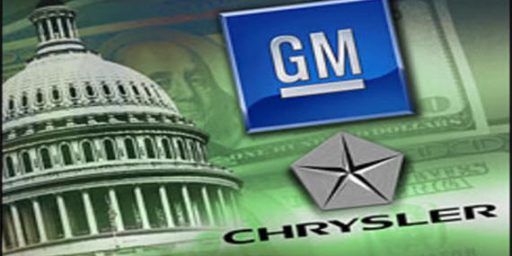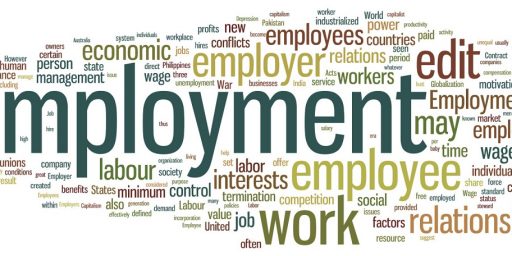Reducing Incomes and Redistributing Misery
In the post about President Bush’s decision to bailout GM and Chrysler I wrote the following,
But if we tweak the economy just right, always elect just the right man…why everything will be fine.
Christ, it really amazes me that so many grown adults have seen this kind of stuff time and again, and still they think there is a pony somewhere there in government intervention in the economy.
For some people there is absolutely no amount of empirical evidence that will move them from a viewpoint.
This prompted Rick Almeida to riposte,
It is equally amazing that so many believe with religious fervor that, if only there were no government intervention in the economy, ponies would spontaneously generate.
And just to clarify on this: I do not think that a market economy with minimal government intervention will bring about Nirvana or spontaneous pony generation.
My view is that many see the legitimate role of government as reducing misery and redistributing income. I think this is a fair characterization of President-elect Obama (see for example his comment to Joe “the Plumber” Wurzelbacher) who said,
My attitude is that if the economy’s good for folks from the bottom up, it’s gonna be good for everybody. If you’ve got a plumbing business, you’re gonna be better off if you’re gonna be better off if you’ve got a whole bunch of customers who can afford to hire you, and right now everybody’s so pinched that business is bad for everybody and I think when you spread the wealth around, it’s good for everybody.
I’d even President Bush thinks this way too. The current bailout of GM and Chrysler is an attempt to reduce misery. It also redistributes incomes from those not in the auto-industry to those in it.
However, my view is that an activist government, on the other hand actually reduces incomes and redistributes misery. Lets take the bailout noted above. It redistributes the misery from being concentrated in the auto-industry and spreads it around to everyone else in the economy. It also reduces incomes by driving up federal debt (we are well on track for a $1 trillion dollar deficit) which will make it harder for people to borrow money as well as increase future debt obligations even faster than otherwise.
To retiterate, I don’t think that simply by reducing the size and scope of government’s role in the economy will bring about ponies and rainbows, spontaneously or otherwise. I do think that it will help limit some of the problems we are having today as I explained in the post here. Lets think of it this way, the government has been spending trillions to avert an economic crisis that could create economic distress for many people. Lets say the number is $2 trillion counting all the money the Fed has been spending, the $700 billion under TARP, and other bailouts prior to TARP. This number is probably too low. We could take that money and send every one in the united states about $6,0000. Think about a struggling family of 4, they’d get $24,000. This strikes me as a far better way of redistributing income and reducing misery than providing a bailout to AIG where upon they haul their sorry butts out to a resort near where I live in California and party hard. If we further restricted the money to people who earn below a certain amount of money it would be an even larger amount.1
I know, I know, we must preserve Wall Street. Why without it the world would end. There would be no more credit and people couldn’t spend money. Well except for the money they earn at their jobs, the money the government just sent them, and money they have saved. But lets not get caught up in logic and reasonableness. Lets panic and make sure that CEO’s who’ve made foolish decisions are allowed to keep their jobs, their bonuses, and have even greater incentive in the future to engage in even more imprudent risk taking behavior.
Surely a winning plan! Corporate welfare all the way baby!
_____
1I can’t wait for the first commenter to post about how that struggling family wont spend the money wisely and thus, we’d be oh so much better off sending it to Wall Street. They have after all demonstrated how prudent they have been the past 10 years.






If that were the limit on it it would be bad enough. But what’s being done is that in order to save jobs in the auto industry we’re redistributing from companies in the auto industry that aren’t on the edge of default to companies that are.
That’s patently unfair to the auto companies other than GM and Chrysler and will cause more jobs to be lost from them than might otherwise have been lost.
And Chrysler and GM have already announced their attention to cut jobs. So we’re subsidizing unsuccessful companies on behalf of (relatively) successful ones and eliminating jobs in order to save them.
The whole thing is crazy.
I think it’s confusing to conflate things that Americans are willing to write checks for year in, year out, with those they only accept in special circumstances.
People like public education, and think it has broad returns to society. They don’t like bailouts that much.
Dave, it’s possible that those in Washington know they are paying for an ordered (and window-dressed) wind-down of GM and Chrysler.
(From Bush’s perspective it’s such a deal! Spend $18B of someone else’s money, and move the problem into Obama’s court. Not only that, the public will probably think of Tarp Phase 1 as “sunk costs” and not really worry where the last bit goes.)
One of the problems is that if GM and Chrysler are fundamentally insolvent (which I suspect) bailing them out once commits us to bailing them out in perpetuity. There’s nothing so permanent as a temporary solution.
/signed
Steve:
I am genuinely sympathetic to your position… but I do wonder if we are in normal times right now. There is a compelling argument out there that even if letting firms slip into bankruptcy is a good idea under normal circumstances, that we are currently in a very delicate situation that calls for suspending standard operating procedures.
Do you think that the confluence of a recession, financial crisis, and housing meltdown may call for extraordinary measures? If not, can you reassure me about what is likely to happen if Chrysler and GM fail right now?
It seems to me that we are playing under a set of unique rules right now, and I am not wholly sure that isn’t warranted.
It is equally amazing that so many believe with religious fervor that, if only there were
nomore government intervention in the economy, ponies would spontaneously generate.It is always “different this time”? It was different during the housing ATM period, right up to the point that the scheme imploded. It was different with internet companies right up until they implode. It was different during the ’30s right up to the point where it was realized that a command and control economy is the best way to keep a depression going.
Make no mistake the correction of this dislocation will be painful and probably horribly so this time. But it is better to get it done and over with fast rather than bleed out over a long period.
Come March, we shall see if GM and Chrysler needed a little investment to tide them over while they adapt to become viable businesses again or if they are in the same condition but with a better organized panhandler operation.
Housing was supposed to go up in price forever. This bubble took a long time to burst. It was visible in the late 90s, and the internet bubble burst barely dented it. My dad, who spent forty years in residential construction, had been through his share and saw it. When I bought my house four years ago, he said it was a smart move — it was an old house, in good repair, at low price and very affordable. Three years ago, the bubble strated to pop here in SE Nichigan, and by summer 2007, it was popping everywhere. And, of course, the solution was to “bail out” all those who took out mortgages they couldn’t afford, and all those who made the mortgages, and all those who invested in the mortgages. Thirty years or so ago, there was a gas price crunch. The big three made small cars that were junk (the Pinto, the Vega, the Dart, the Gremlin/Pacer). Honda, Toyota, Datsun (now Nissan), made small cars that weren’t (the Civic, the Corolla). The big three were in crisis, Chrysler got bailed out. Thirty years later, they still aren’t much in small cars (for a lot of reasons), they lost share in mid-size cars because the people who bought small quality foriegn cars when they were young bought quality foriegn midsize cars when they moved up (the same model Ford, Chevy, Pontiac and Dodge were built on). Since the foreigners didn’t build trucks, mini-vans and SUVs, the big three could dominate those markets — but they lost the entry market, and are losing the car market. Now all of us are expected to make up for the bad decisions the big three have been making — just like we should make up for bad decisions home buyers, real estate speculators, mortgage brokers, bankers, investment firms and insurance companies made. Of course, we have been making up for bad personal responisbility decisions for years — babies out of wedlock, bad work habits, failure to stay in school, to take care of health, to use drugs, etc. Now, along with taxpayers paying for a lack of personal responsiblity, we’re expected to pay for lack of financial responsibility too. And of course, we’ve been witnessing lack of government fiscal responsibility for almost eighty years. Considering we’ve found you can’t depend on the government to fix things, you can’t depend on business, you can’t depend on banks or insurance companies, is it any surprise that many people decide to depend on God?
Hi Steve,
I’m flattered – I generated a post. 🙂
I appreciate your extended comments here, and I suspect that we probably share some pretty broad areas of agreement, both in the world of the general and the more specific.
Perhaps one area where we do disagree is that I suppose I am one who sees “reducing misery” as part of the government’s role. Indeed, I have a hard time envisioning a role for government that doesn’t involve reducing misery to some people. Solving collective action problems, reducing externalities, preserving property rights – these, to me, are all things that reduce misery, and I believe they are good things.
I also think that all government spending is redistributing wealth, is it not? A government that doesn’t redistribute wealth wouldn’t really be in a position to do much of anything, would it? I acknowledge that there are a reasonable number of people who believe that government should do almost nothing, but those views are not widely shared.
Speaking personally, I am troubled by all aspects of these bailouts. I am troubled that those who drove industries into the ground will reap disproportionate benefits. I am troubled that very little relief seems to be making its way to those who have legitimate need. I am troubled that there are no incentives to force bailout recipients to make real changes in business plans and/or operations.
But what particularly bothers me on a personal and professional level are these blithe judgments passed by those largely insulated from suffering. I shudder to think of the impact of 3,000,000+ jobs lost through automaker bankruptcies, not to mention the downstream consequences. I am furious about the crass politicking taking place on both sides of the aisle.
To wind down (you are, I’m sure, grateful), I guess what is bothering me most is what appears to be a total lack of empathy from people like me…educated professionals who are largely insulated from these recent crises. I am deeply suspicious of anyone who can offer categorical statements and broad generalizations without a real attempt to think through the practical consequences of doing nothing in these troubling times.
And hey, thanks for mentioning me on the front page!
Merry Christmas.
The problem is that nothing is so simple. My GM retiree dad just sent me an e-mail pointing out exactly how big the tax breaks were for the foreign auto companies in some of the Southern states. There were figures like $250,000 per job. If you want to end all tax breaks, fine, but it’s not practical. And while the domestic auto companies are struggling mostly of their own accord (no pun intended), it doesn’t help to be competing against that kind of assistance, from not only our own country, but from the foreign manufacturers’ home countries.
That makes it sound like the government has been fair to the American automakers all along. Given the government backing at whiles for the unions, the government now providing funding, in light of their unfunded mandates in the form of that union backing could be seen as fainess.
Thing is, the government and the unions will never admit their culpability.
Man o’ man. Do you remember a couple weeks ago when I predicted an economics backlash?
Paradigm lost
Sometimes I pick up a vibe.
No. That is precisely how government grows both in terms of size and scope. Continue it long enough and the end result isn’t pleasant to think about.
For example, should the government get even more involved in propping up housing market prices? If so, might that ensure that the current glut of housing remains and that there is a long term downward pressure on housing prices thus creating a self-fulfilling prophecy and justifying on-going massive expenditures? Expenditures which, when you get right down to it are a transfer from non-home-owners to home-owners.
No of course not, this is totally unreasonable becuase there are no assurances even with a bailout. Most likely clase, re-organization with the likely removal of senior management would be my guess.
Rick,
If we were to go with your list (I assume it is partial) we’d have a drastically smaller federal government than we do now. There is little to no reason for a federal department of education for example. There is no reason why states can’t handle that issue. And we could considerably revise the scope of powers the EPA has when it comes to externalities, IMO. For example, in some cases states could handle the issues, in some there might be jurisdictional issues and that is where the EPA comes in. In one area where we want a national standard, gasoline blends, we don’t have one and leave it to the states. It is like everyting in this area is turned on its head.
We had a utility in my state go bankrupt. Odd thing is I don’t believe anyone lost their job. There might have been a hiring freeze, but I didn’t hear a thing about reductions in force or layoffs, etc. It is possible GM and Chrysler will disolve, but I think it is unlikely…and with the Car Czar it could happen via the government too.
But the bailouts do precisely that. They insulate those who have been imprudent from facing the results of being imprudent. Instead of being reviled and scorned now they’ll be lionized as saving the company and…wait for it…bonuses. The people working at those companies will think such policies are good, and be more inclined to support politicians that favor them thus perpetuating the cycle.
There are many areas of economics that says, “Don’t do this!”
1. Incentives. By bailing out corporations you actually encourage risk taking by reducing the costs to excessive risk.
2. Dynamic inconsistency of policy argues for rules vs. discretion so that we can better avoid sub-optimal policies.
3. The Higgsian argument about the size and scope of government growing during times of crisis (real or imagined).
Franklin,
We subsidize our current auto industry both directly and indirectly. And yes, it all needs to stop, not be accelerated.
Odograph,
Looks like many in the profession are still on the wrong foot. The problem is one of information and incentives, not the flow of money or macroeconomics. Think micro. Look at the level of markets, firms, individuals, not at the economy as a whole from the top down.
For example, a bank that wants to securitize mortgages in its portfolios…will it want to get rid of the very best mortgages, or the crap? Now you have a “lemons problem” how do you know that the mortgages going into a MBS are really as good as the bank claims? And for a mortgage broker, if you are a bank, how do you know that the homebuyer they have in their office really has the credit and income sufficient to afford the house they are looking to buy (hidden information)? The way the mortgage and financial industry work today works more to hide information than to reveal it. Fretting about monetayr policy and government spending is all fine and good, but it doesn’t get to the meat of the problem.
I read Shiller’s Irrational Exuberance some years ago, so I had a primer on bubbles as the dot-com crested and the housing one got going again. We “knew” that much, but I at least still bought the line that many many banks brought fault tolerance and not fragility.
It sounds like you are alluding to the “you don’t know who’s naked until the tide goes out” scenario. That turned out to be true, for those with less visible ties to mortgages.
FWIW, my reaction to the piece was to ruminate on Taleb’s “narrative fallacy.”
Too many people tell stories to “explain” things and then are lulled by their explanation feeling good to them. They are tempted to extend their model into the future … which can lead to all kinds of ruin, personal and national.
And of course we have dueling narratives about recovery going forward.